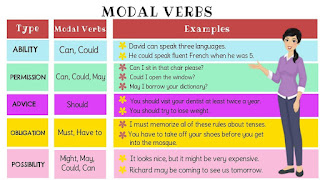| Tema | Imperatives to give recommendations and suggestions. • Modals: must, have to, could, etc. |
|---|---|
| Evidencia | (not set) |
| calificable? | (not set) |
| Activo | 0 |
Propósito
Los verbos modales son verbos auxiliares que no pueden funcionar como un verbo principal, a diferencia de los verbos auxiliares “be”, “do” y “have” que sí pueden funcionar como un verbo principal.
Los verbos modales expresan modalidad, habilidad, posibilidad, necesidad u otra condición. Los utilizamos para el futuro y el condicional.
Como verbos complementarios que son, los verbos modales no funcionan sin otro verbo. Este otro verbo siempre va después del verbo modal y está en la forma base (el infinitivo sin “to”). No se conjugan los verbos modales y no tienen tiempo.
Could” indica posibilidad o habilidad en el pasado.
Joe could speak Spanish when he was young.(Joe podía hablar español cuando era joven.)
I couldn’t sleep last night.(No pude dormir anoche
Could you play an instrument when you were a child?(¿Podías tocar un instrumento cuando eras un niño?)
También se puede usar “could” para posibilidades en el futuro.
You could pass the test if you studied.(Podrías pasar el examen si estudiaras.)
I think it could rain later.(Creo que podría llover más tarde.)
Como “can”, en frases interrogativas “could” puede solicitar permiso o preguntar sobre las posibilidades, pero es más formal.
Ejemplos:
Could you pass the salt please?(¿Podría pasarme la sal por favor?
Could you help me?(¿Podrías ayudarmeCould I be wrong?(¿Podría estar equivocado?)MUST
Must” indica una obligación, prohibición o necesidad. También puede emplearse “have to” (tener que) en frases afirmativas.
You must [have to] read this book, it’s fantastic.(Tienes que leer este libro, es fantástico.)
You must [have to] brush your teeth two times a day.(Tienes que cepillarte los dientes dos veces al día.) We must [have to] leave now or we will be late.(Tenemos que irnos ahora o llegaremos tarde.) You must not drink and drive.(No puedes beber y conducir. When must we meet you?(¿Cuándo debemos quedar? John’s not here. He must be sick because he never misses class.(John no esta aquí. Debe estar enfermo porque nunca pierde clases.) t must be difficult to learn a new language as an adult.(Debe ser difícil aprender un idioma como adulto.) t must be difficult to learn a new language as an adult.(Debe ser difícil aprender un idioma como adulto.) Must you always be late?(¿Siempre tienes que llegar tarde? Must she talk so much?(¿Tiene que hablar tanto? |
Motivación
Review the next links in order to clear about the modal verbs.
Ejercicios
Review your information ,please do sentences using the modal verbs that explai example)ned before.(10
Evaluación
https://www.ejerciciosinglesonline.com/new-exercises/ex1-verbos-modales/
Answer the exercise in the link.
Bibliografía
Foro
Write sentences using the different modal verbs in affirmative,negative or interrogative
ForoCursos
| Curso | |
|---|---|
No results found. | |
Acceso a las actividades
| Actividad | Nombre | Fecha de ingreso | Fecha de actualización | Número de ingresos | Año | Curso | Subreporte |
|---|---|---|---|---|---|---|---|
| 1092 | DIAZ OTALVARO LICE YULIETH | 2020-09-02 13:00:18 | 2020-09-02 13:00:18 | 1 | 2020 | Propósito | |
| 1092 | DIAZ OTALVARO LICE YULIETH | 2020-09-02 13:01:26 | 2020-09-02 13:01:26 | 1 | 2020 | Motivación | |
| 1092 | GONZALES ESGUERRA ISAAC ANDRES | 2020-11-06 14:32:28 | 2020-11-06 14:32:28 | 1 | 2020 | Ejercicios | |
| 1092 | QUINTERO CASTELLANOS DANIEL FELIPE | 2020-09-04 14:50:25 | 2020-09-04 14:50:25 | 1 | 2020 | Tarea | |
| 1092 | TAMAYO PARDO JEIMY LINETH | 2020-11-07 14:47:57 | 2020-11-07 17:44:58 | 2 | 2020 | Tarea |

